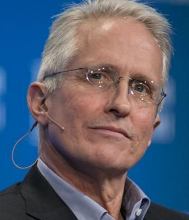Financier James Coulter. Head of TPG Capital
Unfortunately, many ordinary people, and even novice traders and investors, see investment funds as simple companies that have only competently structured their portfolio of shares or bonds, making money on dividends.
In fact, large funds are essentially raiders, with the caveat that everything takes place within the framework of the legislative framework, and instead of thugs with bats, a team of lawyers and financiers sits at the table.
James Coulter's TPG Capital fund is no exception; moreover, TPG Capital has been repeatedly mentioned in the news feeds in connection with scandals, including forceful actions against shareholders.
The biography of James Coulter and his activities at TPG Capital allows you to take off your rose-colored glasses and look at the investment world from a completely different angle.
James Coulter was born into a Protestant Methodist family, Shirley and James W. Coulter, on December 1, 1959. He spent his childhood in Buffalo, New York.
It is worth noting that from childhood, James Coulter showed an inclination towards business and self-sufficiency, and this was instilled in him by his father, who at that time worked as a sales chemist and actively sold Chevron products.
James received his basic education at Shawnee High School. It is worth noting that from childhood he showed a desire to study, and demonstrated good abilities in mathematics, which he later managed to show when entering college.
After school, James Coulter entered Dartmouth College, where he graduated with honors. He was quite an active student, as he was a member of the very influential Alpha Chi Alpha fraternity.
The received bachelor's degree from Dartmouth College allowed him to continue his studies on a scholarship, which Coulter actually took advantage of.
After college, he attended Stanford Business School, where he received an MBA with honors and was named an RJ Miller Fellow.
Career ladder
Many biographers portray James Coulter as a maverick who became a businessman straight out of university.
In fact, after receiving his MBA degree, James managed to get under the wing of a very aggressive and eminent manager, M. Bass, who was at that time the head of the Lehman Brothers Kuhn Loeb hedge fund.
In the company, he was repeatedly involved in the merger of various companies, as well as bringing them into the profitability zone with the further sale of a controlling stake at three times the price.
It was there that he met the key team, which later helped him set out on an independent investment path.
In 1992, after leaving Lehman Brothers Kuhn Loeb, James Coulter founded TPG Capital with his partner David Bonderman. The basic operating principle of the company was practically no different from Lehman Brothers Kuhn Loeb.

The company found a dying enterprise bankrupt, offered a large investment in exchange for a controlling stake, and after a huge injection of funds, the company's shares were sold at an order of magnitude higher.
Many people assessed such activities as a resuscitator, and it was the company that seemed to save the company, but the payment sometimes became destructive.
Almost at the very beginning of his career, James Coulter actively began buying shares in airlines.
So his very first investment, which brought stunning profits, was an investment in the bankrupt airline Continental Airlines, where $66 million was raised.
After some time, the profit from the sale of the company's shares amounted to about $600 million, which was 10 times more than the initial investment.
Unfortunately, TPG Capital did not do without playing dirty in its work, and the company became famous throughout the post-Soviet space.
Thus, TPG Capital was noticed in the armed seizure and redistribution of the large Lenta retail chain, where they, owning only 30 percent of the shares, seized the main office and installed their own director. During such a massacre, about 40 people were detained.
With the days of corporate raids well behind him, James Coulter is worth more than $2 billion with just over $50 billion under management.
